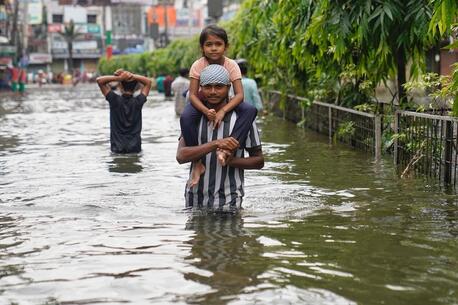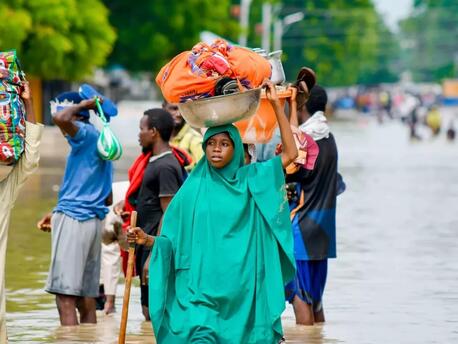
From Dry Abuja to the Waters of Maiduguri: Firsthand Look at Flood Crisis in Nigeria
Severe flooding across West and Central Africa — from Liberia to Nigeria and across Mali, Niger and Chad, to the Central African Republic and the Democratic Republic of Congo — has hit an estimated 4 million people so far this year, many of them children. At least 500,000 people have been displaced more than 300,000 homes destroyed. And even worse flooding is forecasted for later this year.
“Severe weather events are increasingly affecting this region making the environment more difficult for children already facing challenges to realize their basic rights to survival, safety and education," said UNICEF Regional Director for West and Central Africa Gilles Fagninou.
In northeast Nigeria, a burst dam resulted in massive flooding in the city of Maiduguri, Borno State, affecting up to 200,000 people. Other dams in the sub-region are also under pressure with the heavy rainfall, with fears that any similar dam breaks would lead to even greater displacement.
In this first-person account, UNICEF Communications Officer Anike Alli-Hakeem describes the crisis as it unfolded and who and what she encountered on the ground as she provided emergency communication support. This article was originally published on unicef.org.
"The scale of damage caused by the floods was unprecedented"
Tuesday, Sept. 10
9 a.m.: It started like any other day — a typical Tuesday at the office. The usual buzz of meetings, emails and tasks filled the air. I was knee-deep in my work, unaware that my day would soon take a turn. By mid-morning, whispers of a flood began circulating, but no one had enough details yet. It felt like a distant rumble.
By noon, the rumbles became an urgent reality. News broke that Maiduguri was under water. A flash flood had swept through parts of the city, catching everyone by surprise. Suddenly, the routine of the day shattered.
My chief pulled me aside, urgency in his voice. “We need to respond fast,” he said, “and I need you on standby. Your colleague is on leave, and Maiduguri is going to need communications support.” I nodded, feeling the weight of what was happening sink in.
Wednesday, Sept. 11
10 a.m.: The day that followed was a whirlwind. The office was in full response mode. Plans were drawn up, resources allocated, and teams deployed. I spent the day preparing for what might come — coordinating with local photographers and videographers on the ground to gather footage, planning my own travel and waiting for the final call to head out.
My mind was racing, already imagining what it would be like to step into a disaster zone.
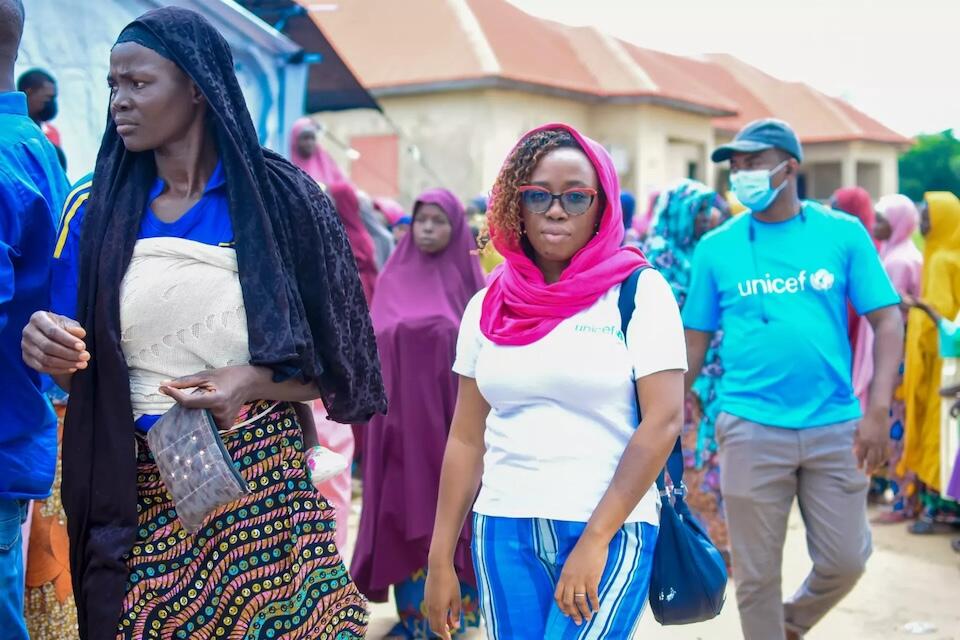
There’s always a sense of helplessness that comes with watching tragedy unfold from afar but knowing that I would soon be there added a layer of responsibility. The lives of the people in Maiduguri were no longer just numbers in a report — they were real, and their stories needed to be told.
I went home that evening, packed my bags and was ready when the call came.
Thursday, Sept. 12
2:30 p.m.: The journey began as the afternoon sun cast long shadows across Abuja. My flight took off, and as we ascended, the bustling city faded into a quiet hum beneath the clouds. There was a sense of urgency in the air — the knowledge that beyond the horizon, the city of Maiduguri was battling something far more devastating than any of us could imagine.
I had read the briefings, watched the reports, but the real stories — the human stories — were waiting for me on the ground.
As we touched down in Maiduguri, the airport was busier than usual. Cars from UN agencies, international NGOs and paramilitary were all waiting to pick up people just like me who had come to support Maiduguri in different capacities.
Victor, the UNICEF driver I was with, told me his house was flooded and he lost many valuables, but the most painful ones were his credentials. He lost all but the ones he had laminated.
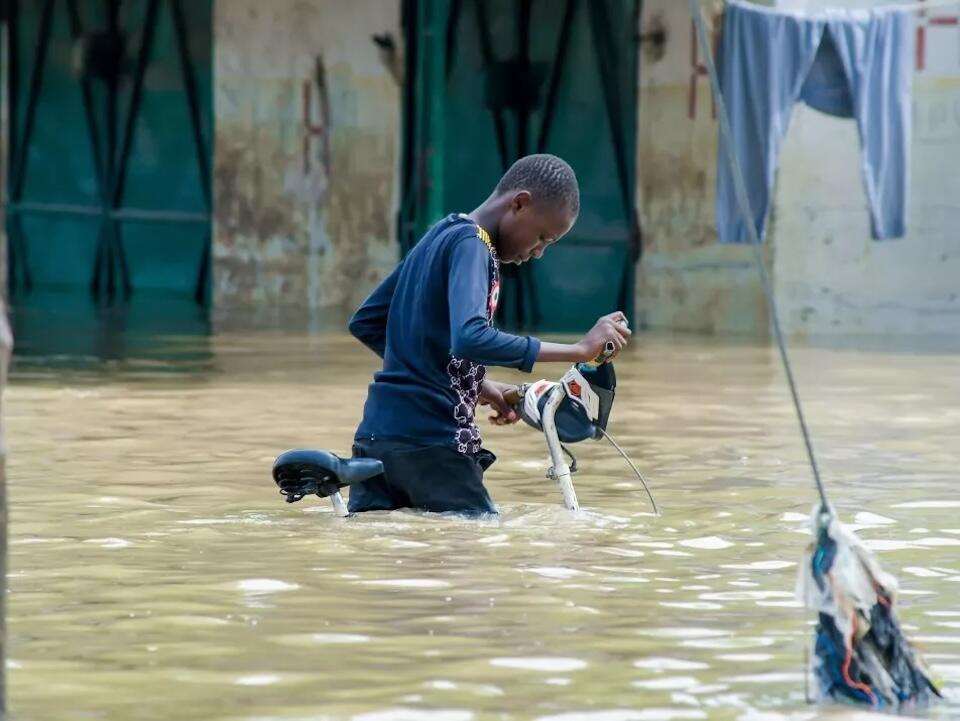
As we drove into the city, the somber atmosphere wrapped itself around me. I imagined everyone I saw was like Victor, trying to do their work or make a living despite the disaster.
3:30 p.m.: I checked into a hotel in one of the dry parts of the city, set out to meet with colleagues and plan out my movement. The brief was quick – the Borno State Government had quickly opened camps to house displaced people and UNICEF was providing health care, nutrition services, sanitation and hygiene support in them. Colleagues were all over the city.
The Borno State Government had quickly opened camps to house displaced people, and UNICEF was providing health care, nutrition services, sanitation and hygiene.
I met up with Bashir, a health officer who gave me some more context: the flood had affected the cold store as well, and he couldn’t access the area.
5 p.m.: I returned to my hotel and held a quick meeting with the multimedia crew to review footage and photos taken of the situation. A couple of aerial shots later, I could see the general area where the cold store is located. It was clear to the eye — the scale of damage caused by the floods was unprecedented.
As I continued to review the footage, seeing so much water brought back a familiar smell to my mind. It was one I had perceived the moment I got into the main city. A smell akin to a muddy riverbank, mixed with rotting food and decay.
There was no time to waste. The flood had left its mark, and the people’s story needed to be told. I knew exactly where I wanted to start.
Friday, Sept. 13
7:30 a.m.: By early morning, I was on my way to Bolori Roundabout along with the film crew to see the extent of flooding with my own eyes and speak with people with inundated homes.
When I got there, we could only fly a drone around the vicinity. We would have needed a boat to get to the cold store facility. Sadly, none was available.
8 a.m.: From Bolori Roundabout, we went into communities in Fori and Galtimari. There we saw people moving around in the floodwaters, carrying whatever possessions they could salvage on their heads. What struck me most was that it was mostly women and children moving through the flood.
We saw people moving around in the floodwaters, carrying whatever possessions they could salvage on their heads.
On inquiring further, I was told that men were staying back to clean their homes where possible, planning with other men, and generally keeping their community safe for fear of leaving their homes empty. For them, the knee-deep floods were manageable – their families could seek shelter at the camps, while they safeguarded their homes.
9 a.m.: Many stories later, I decided to go to the other side of the city, to Dalori camp, one of the camps for Internally Displaced Persons (IDPs) that had been set up by the government. There was only one available bridge connecting two parts of the city, and, understandably, traffic had already built up. Undeterred, we joined the traffic.
As we got closer, we realized road safety officials had stopped all vehicular movement on the bridge – it was giving way under the immense vehicular and human traffic. I quickly made the decision to cross by foot. I joined the throng of people trying to make it across and boarded another vehicle to Dalori camp.
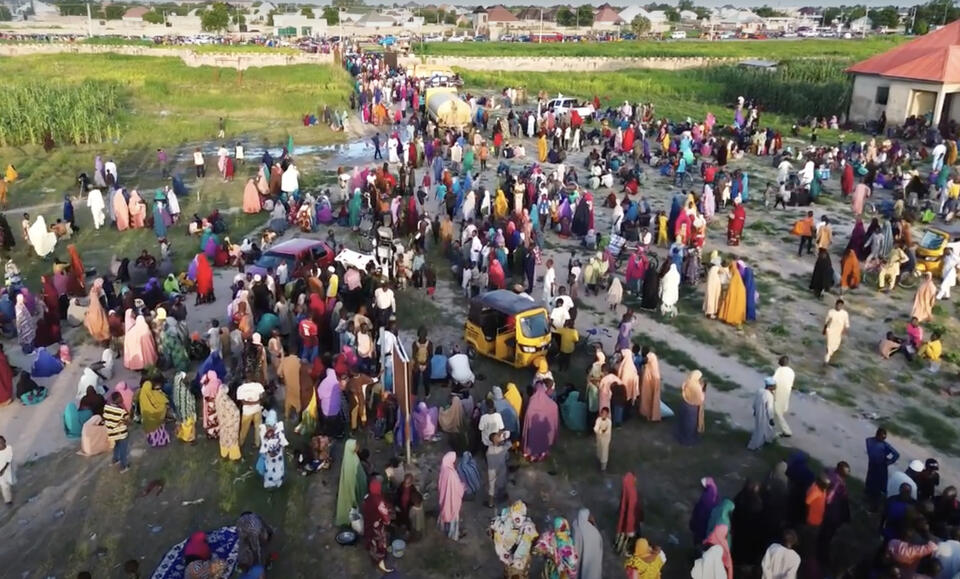
10 a.m.: Dalori camp was a different scene, yet the same sadness lingered in the air. Families huddled together, their eyes searching for answers that were nowhere to be found.
People were seeking health care at the emergency primary health center set up by UNICEF, voluntary community mobilizers were hurriedly promoting hygiene to the people in the camp, children were milling around playing with one another. My camera felt like a lifeline to the outside world, a way to show others the resilience, the strength and the indomitable spirit of these people.
Families huddled together, their eyes searching for answers that were nowhere to be found... My camera felt like a lifeline to the outside world, a way to show others the resilience, the strength and the indomitable spirit of these people.
11 a..m.: Being aware that the bridge leading to this site was unstable, we left the camp and went back to the other side of town. Another bridge trek later, we were on our way to Bakassi camp.
12 p.m.: The scene at Bakassi camp was different from Dalori. There were more displaced people and very wet ground, almost as if people had brought water into the camp. After wading through the mud, I made it to the UNICEF support site.
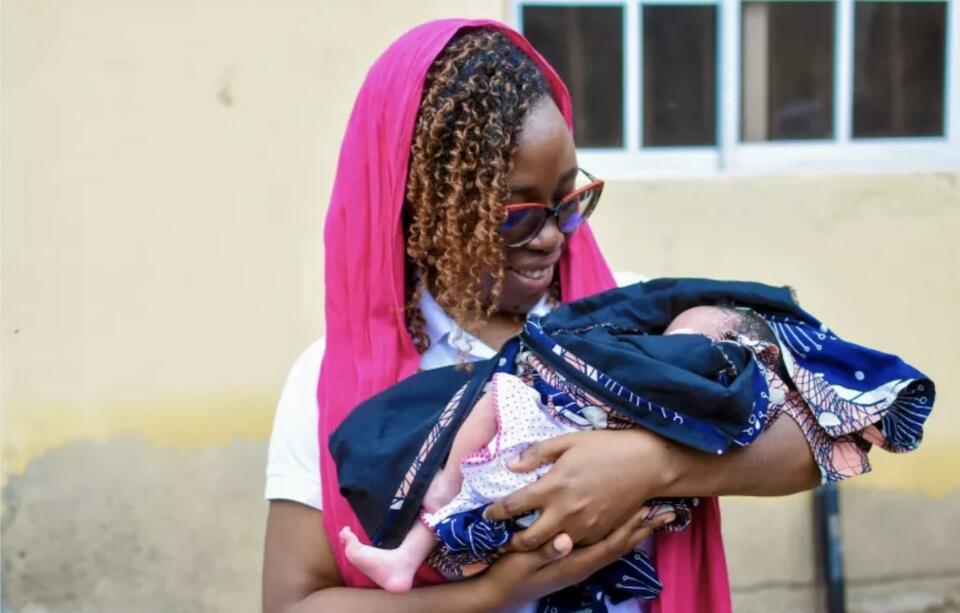
A father determined to protect his children, no matter the obstacles
One of the first people I met was a man named Muhammed. His wife had delivered twins the day before. The twins added to his already bulging family of 18, who were now trying to find space in an already overcrowded part of the camp.
Muhammed had decided to move his family to Bakassi camp with one mission in mind: to get his newborns immunized. His face was etched with exhaustion, but in his eyes, I saw hope. The twins were his future, and he was determined to protect them, no matter the obstacles. UNICEF vaccinated the newborns.
1 p.m.: In the camp, I also met Martha Martins, a nurse and one of the 11 health care workers rapidly assigned to Bakassi camp by UNICEF now administering care to families, even though she herself had been affected by the floods.
Martha's home had been destroyed, but her commitment to her community remained unshaken. “I can’t abandon them,” she said with a quiet resolve. “This is the life of a health care worker. I have to pick myself up fast, to support my community.”
She worked tirelessly, offering what little comfort she could to mothers and children who had lost everything. It was a humbling reminder that, even in the darkest moments, there are those who rise to serve.
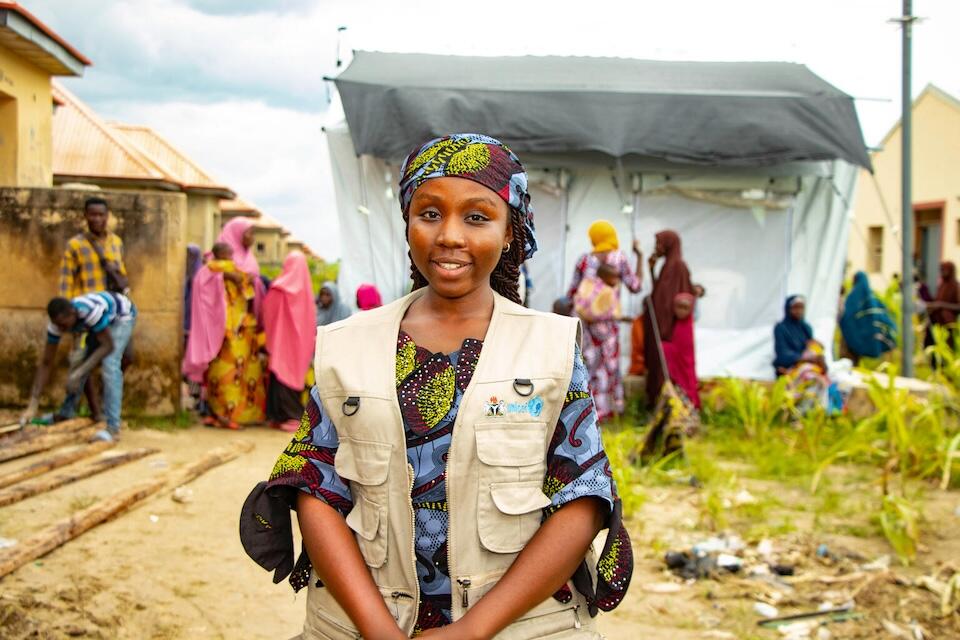
4 p.m.: I receive a call from my Chief. I was needed back in Abuja and another colleague would be sent on emergency surge to continue supporting Maiduguri.
I also needed to provide a last briefing to my filming crew as the UNICEF Representative was arriving in Maiduguri the following morning, along with the United Nations Humanitarian and Resident Coordinator, and heads of other UN agencies. I provided clear instructions on required footage as I would not be there to provide support.
5 p.m.: Several emails later, my last task was to secure footage on a boat before leaving. Maiduguri being ordinarily landlocked, boats are not the easiest to come by. I was put in contact with the State Emergency Management Agency, and they were happy for me to join them on the rescue boats to waterlogged areas. Sail time was 8am!
I wrapped up filming the many stories in Bakassi camp and headed to my hotel – the job of editing videos and getting images ready to be posted on social media had to be done quickly.
Saturday, Sept. 14
8 a.m.: I arrived at the meeting point for the rescue boats, ready to move. Two hours later, preparations were still being made. The water was receding where we stood but getting higher in some other parts of the city. Working together with the humanitarian efforts of the military, the boats would need to be transported by truck to a certain point and then lifted onto the water. Another hour of coordination followed – I had to make a quick call.
11 a.m.: I left the scene to catch my flight. In the end, this footage was not to be filmed by me. I handed it over to my colleague who was to replace me.
12 p.m.: As I headed to the airport, I found myself reflecting on everything I had seen and heard. Muhammed’s hope for his newborn twins, Martha’s quiet courage, and the collective resilience of a community fighting to stay afloat, women salvaging whatever they could while men gather and protect their homes —these are the stories that needed to be told. As my plane lifted off, I couldn’t help but think of all the people still in the camps, still waiting for the floodwaters to recede, still hoping for help to arrive.
This wasn’t just a mission of communication; it was a journey of witnessing human endurance in the face of overwhelming odds. Maiduguri wasn’t broken. Its people were rising, one step at a time.
My mind goes back to the faces of the twins as I sit back and close my eyes. The captain makes his announcements, and the aircraft takes off towards drier lands.
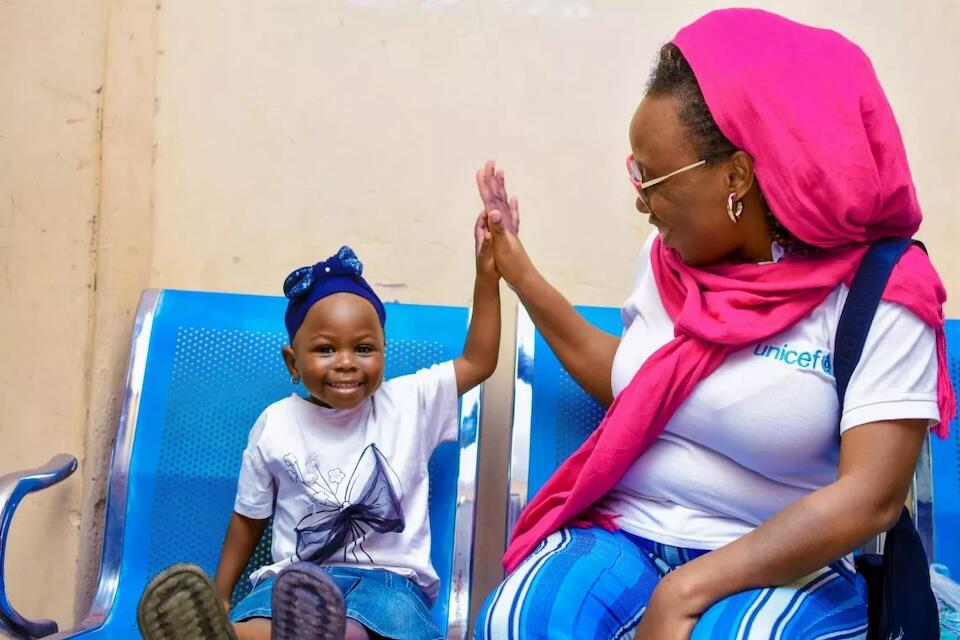
Learn more about how UNICEF is responding to the flood emergencies in West and Central Africa.
UNICEF responds to hundreds of emergencies around the world every year. Your tax-deductible donation can help UNICEF reach more children in need of urgent support and protection. Support UNICEF. Donate today.
HOW TO HELP
There are many ways to make a difference
War, famine, poverty, natural disasters — threats to the world's children keep coming. But UNICEF won't stop working to keep children healthy and safe.
UNICEF works in over 190 countries and territories — more places than any other children's organization. UNICEF has the world's largest humanitarian warehouse and, when disaster strikes, can get supplies almost anywhere within 72 hours. Constantly innovating, always advocating for a better world for children, UNICEF works to ensure that every child can grow up healthy, educated, protected and respected.
Would you like to help give all children the opportunity to reach their full potential? There are many ways to get involved.



